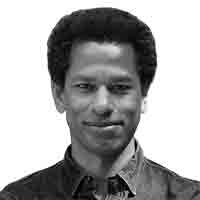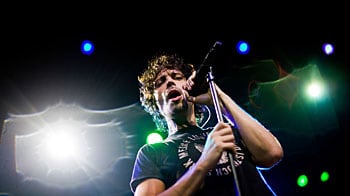
Former Audioslave frontman Chris Cornell has made a genre-bending record with Timbaland. Toure talks with the grunge icon about battling Trent Reznor and taming his Twitter addiction.
Chris Cornell is one of those rare ‘90s rock gods who’s still inspired enough by music to take big chances. The rocker from legendary grunge bands Soundgarden and Audioslave recently released Scream, a collaboration with the superstar hip-hop and R&B producer Timbaland (known for his work with Justin Timberlake, Aaliyah, Missy Elliott, and Jay-Z). Timbaland makes slick, futuristic tracks that don’t seem to have a clear fit into the musical world of Cornell, a man from Seattle who grew up intensely listening to the Beatles. But the two spent months in Miami collaborating on Scream, which, Cornell says by phone from Detroit, “is an ambitious album which is one hour of nonstop music, almost from a movie soundtrack.”
The album finds Cornell in a totally new place, singing over tracks unlike any his fans have ever heard him interact with (for Timbaland fans who are used to a wide variety of vocalists using his tracks, the leap is less). Predictably, many fans and critics haven’t been too pleased. It’s easy for rock stars to dismiss the misgivings of critics and to focus on fans who appreciate the music over those who don’t, but it’s harder for them to shrug off the critique of their peers. Especially when they’re critical in public.
Recently, Trent Reznor, the only official member of Nine Inch Nails and an avid Twitterer (@trent_reznor), tweeted “You know that feeling you get when somebody embarrasses themselves so badly YOU feel uncomfortable? Heard Chris Cornell’s record? Jesus.”
Cornell, also a tweep (@chriscornell), replied “What do you think Jesus would twitter. ‘Let he who is without sin cast the first stone’ or ‘Has anyone seen Judas? He was here a minute ago.’ ”
Nothin’ says the 2000s like a rock feud conducted via Twitter.
When a rock 'n' roll brother like Trent Reznor says something negative, does that irritate you?
I’d be lying if I suggested that after all this time hanging around with guys in bands that we don’t sit and bash on other people’s music, which everybody does. And the fact that there’s a forum for it like Twitter means those comments can become more public, and you make the decision to put yourself in that position. The Internet is takes on its own life now, and to be honest, people are talking about this record more than any one I’ve ever put out, and I think that’s a good thing.
Is there some feeling that within the fraternity of rock 'n' roll or artists that you should bash in private and not make it public like that?
I’ve never felt like it’s that fraternal. My personal choice would be that it would definitely be private, and I’ve decided to keep my opinions to myself because it’s all subjective anyway. It’s an art form. It’s not sports, it’s not a game where whoever gets the most points wins. One person might dislike something, but for another person it might be extremely important to them. That’s why for me it’s been important to keep my mouth shut, period.
So how’d this collaboration with Timbaland come about?
I was looking for some remixes and it became a back and forth conversation that ended up as a whole album. I was in the middle of touring and basically canceled on it, and went in and made the album. It was something that came together really quick.
What’d you know of Tim before you started this? You guys weren’t friends, right?
No, I had heard stuff he’d produced, where I’d not even known it was him. I heard some of his production with Missy Elliott, which I thought was amazing.
“For me there was also a feeling like this would be a great time to completely leave everything that I know and am comfortable with and am used to in terms of songwriting and album production and recording process,” Cornell said.
As two guys did you click like, "Yeah, I wanna hang out in a bar with him," or was it just business?
I don’t think either of us are like that with anybody to be honest. I think where we clicked is he’s into creating music and I’m into creating music and that’s what we do. But I’ve never really hung out with any producer I worked with at a bar.
This is a big shift for you sonically. Musically, when you’re interacting with his tracks, how is it different for you? How do you have to adjust as a singer to these tracks versus the rock you’ve come from?
Lyrically, it’s different because it’s a different musical landscape so there are different characters, ideas, subjects, and voices that pop up in your head. The actual singing is pretty natural for me. It just comes out the way it comes out. I don’t worry about that too much. The only difference on this album is the scope of the vocals. Every single song is pretty huge so there’s a lot of singing.
The different musical landscape inspired you to write different things?
There was a different musicality so there was a different aura around us, which inspires a completely different thing. Which is why when new bands get together they’ll write three albums' worth of material in a year and then it takes ‘em 10 years to make another. It’s just that sparking off somebody and their inspiration. When it’s new for you, it opens up an avenue and shines a light on a whole new corner of your creativity.
How was your relationship with Tim different than other producers you’ve worked with?
It’s hard to compare him because he’s a collaborator. Besides David Arnold, Timbaland’s pretty much the only producer that I actually co-wrote material with. That’s a huge difference, because they become almost like a bandmate.
I think it’s really important for people to do albums with one producer. You get these albums where there’s six or 10 different producers and the sound goes all over the place and there’s no cohesion, but an album like yours whether people love it or not, there’s a single vision that runs through it.
That’s where the idea came from in the first place. He said, “I don’t wanna do remixes but I’m a fan and I would love to do a couple original songs,” and I thought, "Exactly." I didn’t see an artistic vision for an album with multiple producers. But I did see a vision for the combination of two people that would be so unlikely and would produce something that would be so unpredictable. For me there was also a feeling like this would be a great time to completely leave everything that I know and am comfortable with and am used to in terms of songwriting and album production and recording process. It was a great moment to go in and learn a whole different way and be a participant in a whole different way of making music in a way that’s more than a song here or there. An album that would be a real moment in my career.
Touré is the host of BET’s The Black Carpet and the host of Treasure HD’s I’ll Try Anything Once. He is the author of Never Drank the Kool-Aid, Soul City, and The Portable Promised Land. He was a contributing editor at Rolling Stone, was CNN’s first pop culture correspondent, and was the host of MTV2's Spoke N Heard. His writing has appeared in The New Yorker and The New York Times.




